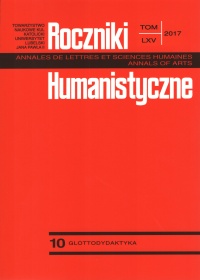Attachment Glottodidactic Dictionary as a Lexiciographic and Didactic Problem
Abstract
In the glottodidactic practice there was a breakthrough resulting from a change in the approach to teaching vocabulary. In the currently prevailing communication approach, attention is paid to the necessity of system, rather than systematic, teaching vocabulary, giving it a slightly higher rank. In this situation, glossodidactic reflection takes on the importance of dictionaries and analytical work devoted to them. Previous literature on the subject includes general and glottodidactic dictionaries (didactic and pedagogical) as well as discussion of their features and methods of use in the didactic process.
The purpose of this article is to draw attention to the complexity and importance of the problem, which is so called the attachment dictionary. For the purpose of the article, the term attachment glottodidactic dictionary is formulated, which is understood as a dictionary placed at the end of the handbook for learning a foreign language. In the theoretical assumption, an attachment dictionary consists of dictionaries placed in individual didactic units of a given handbook. The contents of the attachment dictionary should therefore reflect the contents of the individual dictionaries. The handbook by Kamila Dembińska and Agnieszka Małyska Start 1 Survival Polish. Podręcznik do nauki języka polskiego na poziomie A0 [A guide to learning Polish at A0 level] was chosen as the basis for the analysis.
References
Dembińska K., Małyska A., Start 1 Survival Polish. Podręcznik do nauki języka polskiego na poziomie A0, Warszawa 2010.
Dembińska K., Małyska A., Start 1 Survival Polish. Zeszyt lektora, Warszawa 2010.
Lipińska E., Seretny A., Integrowanie kompetencji lingwistycznych w glottodydaktyce na przykładzie nauczania języka polskiego jako obcego/drugiego. Poradnik metodyczny z ćwiczeniami, Kraków 2013.
Malasińska I., Uczymy posługiwania się słownikami, „Języki Obce w Szkole” 45 (2001), nr 4 (226), s. 74-75.
Martyniuk W., A1 – elementarny poziom zaawansowania w języku polskim jako obcym, Kraków 2004.
Miodunka W. (red.), Nauczanie języka polskiego jako obcego: materiały z pierwszej konferencji, Kraków 1997.
Ostromęcka-Frączak B., Historia leksykografii słoweńskiej, Łódź 2007.
Ostromęcka-Frączak B., Słownik dwujęzyczny i jego rola w nauczaniu języka polskiego jako obcego, [w:] taż (red.), Polonistyczna edukacja językowa i kulturowa cudzoziemców, Łódź 1998, s. 389-395.
Ostromęcka-Frączak B., Słowniki dydaktyczne do nauki języka polskiego jako obcego. Teoria i praktyka, [w:] J. Mazur (red.), Polonistyka w świecie. Nauczanie języka i kultury polskiej studentów zaawansowanych, Lublin 2000, s. 323-331.
Seretny A., Słownictwo w dydaktyce języka. Świat słów na przykładach języka polskiego jako obcego, Kraków 2015.
Copyright (c) 2017 Roczniki Humanistyczne

This work is licensed under a Creative Commons Attribution-NonCommercial-NoDerivatives 4.0 International License.





